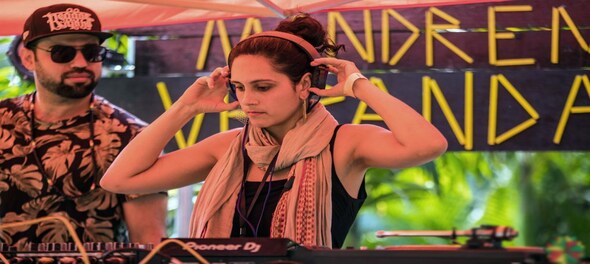
Nineteen young women from various field of work – from journalism and activism to music, fashion and design – have come together with one goal: seeing concrete changes in the music industry with regards to its sexism, safety and the lack of inclusivity. Their initiative Coven Code was formed organically after they met at a Selector Pro: Women in Electronic Music workshop by Wild City and British Council in March 2018.
A month later, they performed their first gig at Auro in Delhi, where DJs, visual artists and photographers put together a diverse showcase. This event gave them a chance to carve out a space for themselves in the music industry and make it more inclusive for women.
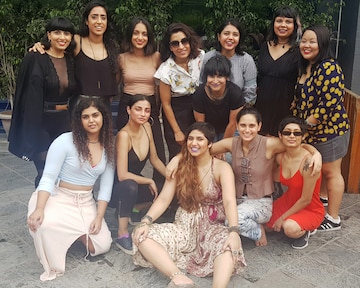 Coven Code
Coven CodeFrom there on, they solidified into a closer knit collective and have maintained a consistent presence in Delhi’s nightlife space. Their music expertise lies in various genres and soundscapes, and they are constantly experimenting with new kinds of music.
Nandini Bansal (aka Lush Lata) describes her music as a play on samples and soundscapes, which is reflected in her productions as well as her mashups. Pia Collada mixes hip-hop with reggae, afro beat and dancehall to show people that they can vibe to all kinds of music they might not usually hear in a club setting in Delhi, including up and coming female and queer artists in the global music industry. Prabhjit (aka House of Nari) usually produces radio and is currently undertaking a show that features women in music called the House of Nari podcast.
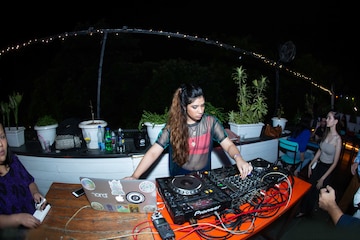 Zainab Wani (aka Zequenx) at Boxout Weekender
Zainab Wani (aka Zequenx) at Boxout WeekenderMeanwhile Zainab Wani (aka Zequenx) started off with a passion to make psytrance and is producing dark ambient music, acid techno and a wee bit of acid electro. Vidisha Saini (aka Fadescha) works with field recordings and found sound, as an artist and a producer doing installation and live performance practice.
Priyamvada (aka Priyam) likes to mix funk and jazz with hip-hop, RnB, grime and DnB, and is experimenting with live coding music. Esther (aka E), being exposed to all kinds of sounds and genres over the years, plays hip-hop, grime, UK Garage, DNB, hass heavy and trap in her sets, and is exploring tech-house, techno and deep-house; she doesn't want to confine herself to one specific genre.
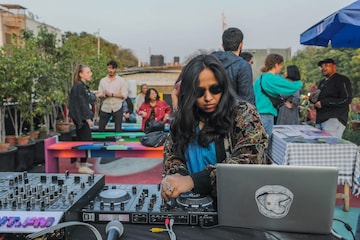 At the F(r)iction at Kona mixed-media art exhibition
At the F(r)iction at Kona mixed-media art exhibitionCoven Code is also trying to work towards creating a space where sexist structures in the industry are undercut by an inclusive approach. Their events are open and inclusive to all allies, and there’s zero tolerance for sexual harassment, unwanted touching, stalking and all forms of discrimination based on gender, disability, sexuality, race, religion, class, caste or age. They also use social media to let others know that they can reach out for support – both at nightlife events and through outreach channels.
Six members of the collective played at the Boxout Weekender this April, while there are many other individual and collective projects and gigs that Coven Code members have in the pipeline. By the virtue of being all women, they first try to make their own parties safe by monitoring guest lists, the door and through feedback from patrons. At the same time, they are constantly learning and working on how to make attendees feel comfortable.
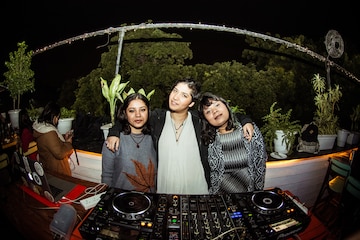 Shireen, Zainab and Vidisha at the DJ console
Shireen, Zainab and Vidisha at the DJ consoleAs Zainab says, “The first step we’ve been able to accomplish is bringing more women into the Indian music industry. Balancing the ratio helps other women feel more comfortable working in the scene. It’s more about having a sister to rely on who will trust your gut feeling about wanting to get out a certain situation or feel uncomfortable around someone.”
Vidisha, who is currently in Beijing as a part of the nightlife residency, adds to this, “Even with the ethics around DJing, as showcasing women producers, emerging artists, and so on, we are trying to find ways to collaborate and create opportunities through programming and workshops too. To create a safe space for women on the dance floor will take a lot of work, and it is by creating space for others that we can make nightlife a transcultural space.”
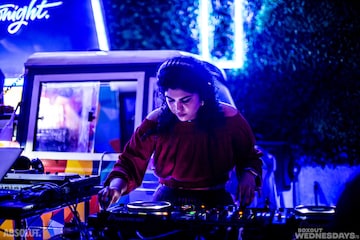 Priyam is inspired by M.I.A., Pussy Riot and Kaytranada
Priyam is inspired by M.I.A., Pussy Riot and KaytranadaAdvising struggling female talent in the music industry, the girls share their nuggets of advice. Pia says, “Reach out. There is strength in numbers.” Nandini encourages women to stop shying away from things they want to try. Shona believes that “being in the company of other women in similar spaces as you is really empowering.”
Oindrila would advise women to be vocal and not afraid of standing up for themselves, and Zainab encourages women to bring their A-game. “Being on top of your game is crucial, the rest will follow,” she says. Priyam says, “Use the internet! Find tutorials, music and community online if you don’t have access to them outside.”
Esther adds, “Hard work, consistency and humility will take you a long way.” Shireen says, “Keep reaching out and keep looking for meetups in your area, and most importantly, never give up on the music.” And Chandni says, “There’s room for a lot more women in all aspects of nightlife before it starts to look balanced, so dive in and be persistent. Opportunities will open up.”
First Published: May 31, 2019 3:37 PM IST
Check out our in-depth Market Coverage, Business News & get real-time Stock Market Updates on CNBC-TV18. Also, Watch our channels CNBC-TV18, CNBC Awaaz and CNBC Bajar Live on-the-go!


2024 Lok Sabha Elections | Why Kerala is in focus as the second phase begins to vote
Apr 26, 2024 9:33 AM
Bengaluru Rural Lok Sabha election: Over 35% voter turnout recorded by 1 pm
Apr 26, 2024 9:11 AM

